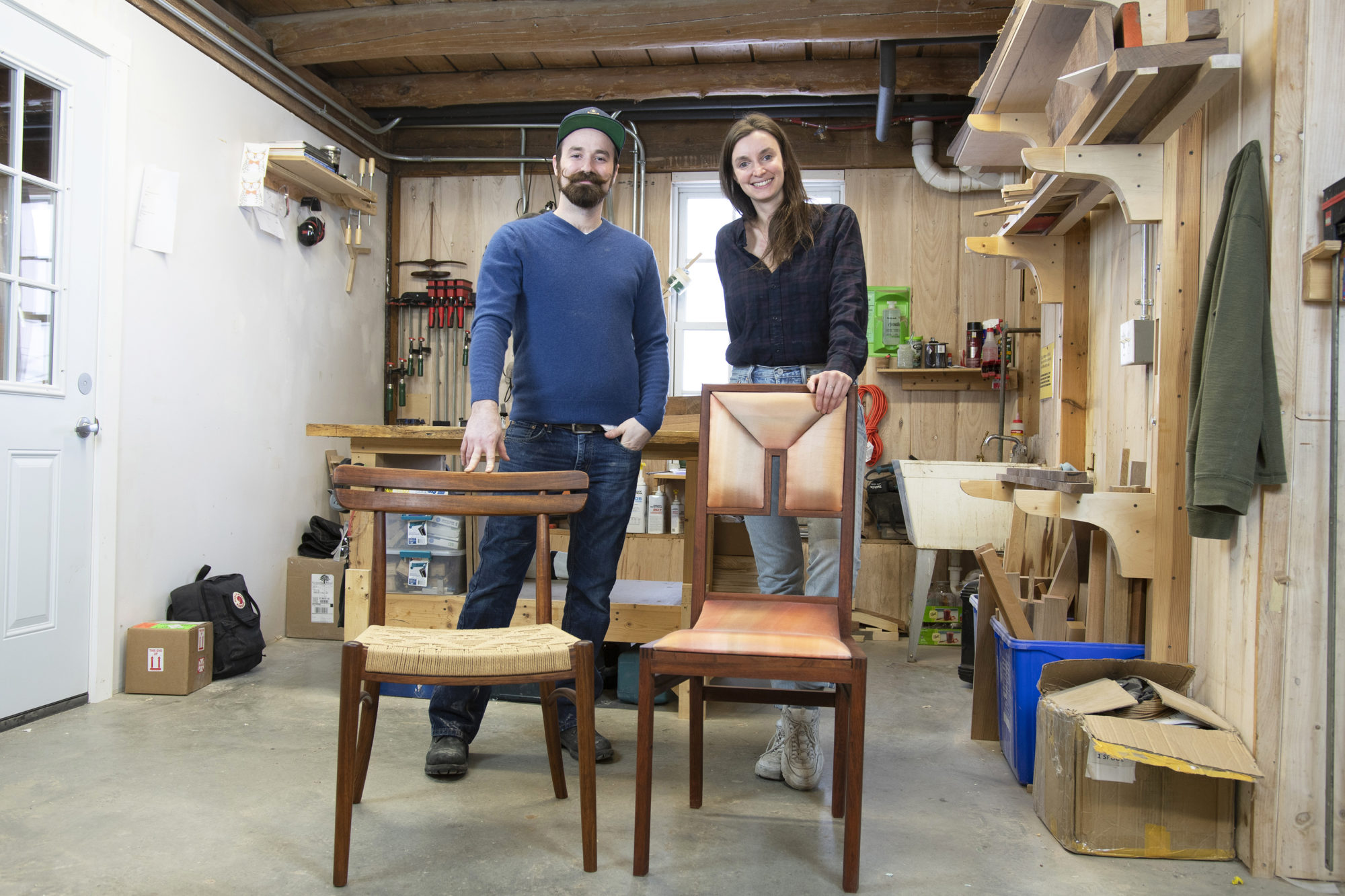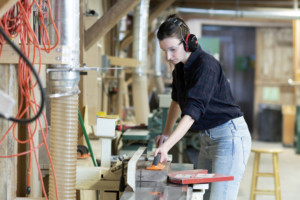2018 Emerging Woodworker of the Year, Towards Nightfall, Finds Home in Vermont
April 15, 2019

Neither Jared Williams nor Catherine Emil planned to stay in Vermont after graduation, but “felt it was impossible to leave…in a good way.” After completing a four-semester immersion program at Vermont Woodworking School, the two friends intended to part ways, returning to their respective homes in New York and San Antonio, Texas. As they considered their newly acquired skills and compatibility as business partners, however, the idea of founding their own furniture-making shop began to take hold. “At that point, we looked at the incubator space available at the school, which includes access to tools and machinery that would have been prohibitively expensive, as well as to our teachers and mentors, and the idea of trying to establish a start-up anywhere else seemed crazy,” said Catherine, co-founder of Towards Nightfall. “Vermont had everything we needed,” agreed Jared.
The pair, who were recently awarded Vermont’s 2018 Emerging Woodworker of the Year Award from the Vermont Wood Works Council, founded Toward Nightfall with the idea of using their skills and knowledge to push the boundaries of how lightweight and ethereal wood furniture can be. “Vermont Woodworking School provided a deep understanding of materials and construction techniques, which allows us to design furniture that is super light and elegant,” said Catherine.
“Catherine and Jared’s enthusiasm to work and stay in Vermont demonstrates so much positivity to the next generation of wood craftspeople in our state,” said Erin Lorentz, Executive Director of the Vermont Wood Works Council, “and their work is exceptional.”
Finding their Niche
On the naming of the business, Catherine refers to a Mark Rothko quote: “Often, towards nightfall, there’s a feeling in the air of mystery, threat, frustration – all of these at once. I would like my paintings to have the quality of such moments.” “We love what this quote says about our creative process,” said Catherine, “and, in a more literal sense, the idea that you enjoy furniture at the end of the day, towards nightfall, when you return home.”
Their first pieces include mainly tables and chairs made for high-end customers looking for a modern, contemporary aesthetic, and the company is already gaining a reputation for its use of color and unconventional materials. Both Jared and Catherine point to the Lil Sporty Dining Table, a crossover ping-pong and dinner table made from mahogany with a malachite inlay, as one of their favorite pieces. “It has an old-school, Royal Tenenbaum vibe,” said Catherine. “The client wanted a dining table that could convert to a ping pong table after dinner, and we came up with the idea of using a stone inlay to make the boundary lines.” Jared also points to the use of brass stretchers in the Nocturne Dining Table and a Danish cord shelf on the Dundee 3 Side Table. “It’s the use of different types of materials and colors that differentiate our work,” he said.

Catherine Emil, co-founder of Towards Nightfall, uses a jointer at Vermont Woodworking School in Fairfax. Photo by Erica Houskeeper.
Jared and Catherine share equally in the design and build process, and note their compatible business skills as key to their partnership. Jared, who managed restaurants in San Antonio, is the primary project manager for the business, organizing jobs so that when Catherine comes in, they can get to work. For her part, Catherine takes the lead in sales and marketing, managing the company’s website and social pages and frequently traveling to New York to meet with clients.
Vermont’s Woodworking Community
As they navigate building a startup, they have found support from Vermont’s woodworking and business communities, including the Vermont Wood Works Council, Meredith Davis, a business development coach who Catherine calls her “hero,” Carina Driscoll, founder of the Vermont Woodworking School, Brent Karner of ClearLake Furniture, and Charles Shackleton of ShackletonThomas who they met through the Guild of Vermont Furniture Makers. “Everyone has been so open,” said Catherine. “I don’t think you get that outside of Vermont.”
While they don’t see the Vermont brand as part of their marketing at this stage, being part of the local economy and supply chain is important to both. They use local wood whenever they can and are committed to purchasing through local suppliers including The Treehouse Hardwoods and Millshop in South Burlington, Exclusively Vermont Wood Products in Bristol, Maple Landmark in Middlebury, and Baker Lumber in White River Junction.
“Sustainable building is not just about material choice,” said Catherine. “It’s also awareness of where and how the final product is made. Buying furniture that is made using unethical labor in a foreign country, shipped across the world in an oil-fueled ocean liner, sold inexpensively to U.S. consumers, and doesn’t last more than a few years is not a sustainable choice. Buying from mills here in Vermont means we are supporting the local economy and using wood that has been harvested responsibly.” A 2013 study on the Importance of Vermont’s Forest-Based Economy reports that furniture and related wood product manufacturing contribute $171 million and 1,600 jobs to Vermont’s economy.
Asked what the future might hold for Towards Nightfall, Jared and Catherine both hope to someday design a line of furniture, while maintaining their commitment to local design and manufacturing, and exceedingly high personal standards. “We want to love every design we create for our clients,” adds Jared. “If we wouldn’t want it in our own homes, then we go back to the drawing board.” In the meantime, the pair will continue to grow their commercial and residential portfolio from the incubator space at the Vermont Woodworking School where they are working on a set of “colorful” tables. To see examples of their current work, please visit www.towardsnightfall.com.
About the Vermont Forest Industry Network
Vermont’s forest products industry generates an annual economic output of $1.4 billion and supports 10,500 jobs in forestry, logging, processing, specialty woodworking, construction and wood heating. The Vermont Forest Industry Network creates the space for industry professionals from across the entire supply chain and trade association partners throughout the state to build stronger relationships and collaboration throughout the industry, including helping to promote new and existing markets for Vermont wood products, from high quality furniture to construction material to thermal biomass products such as chips and pellets. For more information please visit www.vsjf.org.
Feature photo caption: Jared Williams and Catherine Emil are makers of the Wegner Chair, left, and Lucien Chair, right. They make the chairs and other pieces in their woodworking shop at Vermont Woodworking School in Fairfax, Vermont. Photo by Erica Houskeeper.




